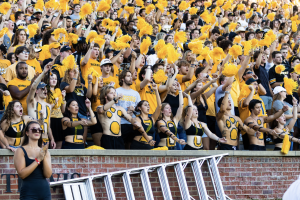Student Guide to In-Person Missouri Voting
How to register to vote
The registration deadline for the general election is Oct. 9, 2024. Tuesday, Nov. 5, 2024 is Election Day.
Register to vote here. You can also check your registration status here.
What is on the ballot?
The state of Missouri will have six statewide ballot measures appear on the ballot this November. Four of the measures were citizen-initiated, meaning citizens collected a set amount of signatures for the measure, and two were legislatively referred, meaning the legislature voted for the issue to be on the ballot.
2024 Ballot Measures
*Note: this is a brief description of the Ballot Measures for this general election, for Official Ballot Title and Fair Ballot Language use the link provided here.
- Amendment 2– Legalize and regulate sports betting for those over 21
- Citizen-initiated constitutional amendment supported by Winning for Missouri Education
- Amendment 3– Establish the right for individuals to make decisions about their reproductive health care, including abortion and contraceptives, without government interference, and allow abortion to be restricted or banned after fetal viability except to protect the life or health of the woman
- Citizen-initiated constitutional amendment supported by Missourians for Constitutional Freedom
- Amendment 5– Allow the Missouri Gaming Commission to issue one additional gambling boat license that operates from the Missouri River to the Bagnell Dam
- Citizen-initiated constitutional amendment supported by Osage River Gaming and Convention
- Amendment 6– Amend the Missouri Constitution to raise costs and fees to support salaries and benefits for law enforcement personnel
- Legislatively referred constitutional amendment
- Amendment 7– Allow only citizens of the United States to vote and prohibit rank choice voting- when voters rank multiple candidates for each position and votes are reallocated until one candidate receives a majority of the votes
- Legislatively referred constitutional amendment
- Proposition A- Increase minimum wage to $13.75 per hour in 2025 and increase the minimum wage again to $15 per hour in 2026; require employers to provide one hour of paid sick leave for every 30 hours worked
- Citizen-initiated state statute supported by Missourians for Healthy Families & Fair Wages
Statewide Offices
*Note: These are the candidates for the majority parties, for more information about the additional third parties and candidates running in these elections, use the link here.
- Senate: Josh Hawley (Republican), Lucas Kunce (Democrat)
- Governor: Mike Kehoe (Republican), Crystal Quade (Democrat)
- Lieutenant Governor: David Wasinger (Republican), Richard Brown (Democrat)
- Secretary of State: Denny Hoskins (Republican), Barbara Phifer (Democrat)
- Treasurer: Vivek Malek (Republican), Mark Osmack (Democrat)
- Attorney General: Andrew Bailey (Republican), Elad Gross (Democrat)
Other Offices
In addition to statewide offices, there will be several other positions up for election across the state ranging from the federal level to city level. The candidates up for election will depend on where you are registered to vote. Find some of your candidates here.
*Note: These are not the only positions that will be up for election. There will also be local positions up for election. Contact your Local Election Authority here to learn more about your candidates.
How to vote
In Person Voting
- Polling locations are open from 6:00 a.m. to 7:00 p.m. on Election Day.
- Voters may only vote at their assigned polling location. If this is not possible for you, consider making plans to vote absentee.
- You will need an ID to vote, acceptable forms of voter ID include:
- A non-expired Missouri driver’s license or non-driver license
- A non-expired military ID or veteran’s ID card
- A non-expired United States passport
- Photo ID issued by the United States or the state of Missouri that is not expired
- If you do not have a form of ID, but are a registered voter you may cast a provisional ballot.
- Provisional ballots will count if they are returned to polling places on Election Day with an acceptable form of photo ID or if the signature on your provisional ballot matches the signature on your voter registration record.
Absentee Voting by Mail
- Request an absentee ballot here.
- Find local election authority contact information here.
- Voters can request absentee ballots from their local election authority in person, by mail or by email.
- Absentee ballot applications must be sent to the local election authority by 5:00 p.m. on Oct. 23 in order to be valid.
- First-time voters who have not voted in person need to submit a copy of their ID with their ballot, unless they already provided a copy with their registration application.
- After you receive your ballot, make sure you follow the instructions provided on how to properly fill out the ballot.
- If you return your ballot by mail, have a notary sign it and mail your ballot back to the address on the return envelope.
- If you return your ballot in person, you must sign the affidavit in front of the election official.
- Absentee ballots may be returned by mailing service or in person, and must be received at the election authority’s office by 7:00 p.m. on Election Day.
Voting Absentee in Person
- Anyone registered to vote from Oct. 22 until Nov. 4 may vote with an absentee ballot in person at a location designated by their local election authority.
- Voters will still need an acceptable form of voter ID.
- Find your local election authority contact information here.
Accessible Voting
- Curbside Voting: Voters with mobility issues can vote curbside by contacting a poll worker and requesting a ballot be brought out to them.
- Accessible Polling Places: If your polling place is not accessible due to physical disabilities you can request a different, accessible polling place by contacting your local election authority here.
- Accessible Voting Systems: Every polling location has an accessible voting system for voters with disabilities. Accessible systems include an audio ballot to make selections and the ability to enlarge text.
Information written by Sophie Pfahl, design by Matthew Jacobi
Did you know?
Citizen initiated constitutional amendments require a number of signatures equal to 8% of the votes cast in the last gubernatorial election from two-thirds of the state’s congressional districts. In order for citizen initiated constitutional amendments to be approved they must receive the majority of the votes.
Did you know?
Citizen initiated state statutes require an amount of signatures equal to 5% of the votes cast in the last gubernatorial election from two-thirds of the state’s congressional districts. Approval of a citizen initiated state statute requires the majority of votes.
Did you know?
Legislatively referred constitutional amendments require a majority vote in 1 legislative session of the Missouri General Assembly to appear on the ballot. Legislatively referred constitutional amendments must then receive a majority of votes in the election to be enacted.












